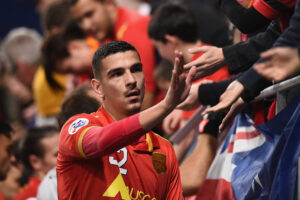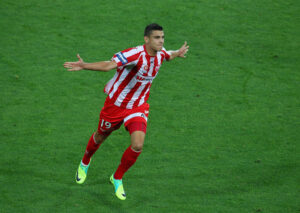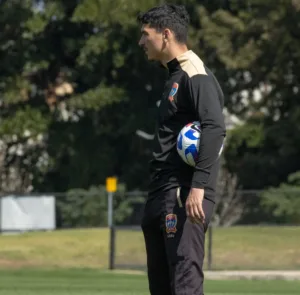Like any life cycle, a professional athlete’s career has a start and an end.
But no athlete quite knows exactly when the end may come and the circumstances that may bring about retirement.
For Babalj, that came at the age of 30, when the striker had to retire from professional football due to injury. After a 12 year career that was riddled by injury setback after injury setback, Babalj was already thinking ‘what next’ as he prepared for life after playing.
Having completed his studies outside of football, Babalj secured a job shortly after he retired.
His last year at the highest level was with the Newcastle Jets in the 2021-22 A-League Men season, and it’s the same club where he’s entered the next phase of his footballing journey as their Football Operations Manager and assistant coach of their senior men’s side.
Eli Babalj puts the cherry on top of a @NewcastleJetsFC masterclass 💥
Jets dominate at home with a much needed 4-0 win over @WgtnPhoenixFC.
Full time wrap: https://t.co/jNgM0QdWec#NEWvWEL #WeAreALeagues pic.twitter.com/UL9x2NaBFv
— Isuzu UTE A-League (@aleaguemen) March 18, 2022
Not every player is afforded this luxury. Some find it hard to find work after football. Others quite simply don’t know what to do.
Babalj, however, had been thinking about the next phase for a while and with the help of the PFA, he began to map out where his future laid after his playing days were over.
“I did a few years ago (think about retiring), I spent a bit of time without a club during Covid and a bit before that with injuries,” he tells the PFA.
“There were a couple of situations throughout my career where I thought, will I get another contract or will I be given another chance and it made you think: ‘okay, what’s next?’
“That’s where the PFA was great, the Player Development Managers helped push you into and guide you and gave you suggestions and advice about what you can do.
“I was lucky enough to do a post grad in Football Business and I carried on to do a Masters in Sports Management which helped me get this gig in the first place.
“I had started my coaching badges while I was playing. It’s very important, I hope the PFA continue to do that work because when I was 18 and they’d come in, I used to think ‘oh, don’t worry about that, I’ll worry about that when I’m 30’.
“But I wish I had started it earlier, because in your down time you can actually switch off and learn, and get qualifications instead of overthinking because you have a lot of down time as a player.
“I’m glad I ended up doing it, I still ended up finishing it on time. It’s never too late or never too early to start.”

When Babalj took on the new role, a lot of his former teammates soon became the people he was looking after in his role in football operations. They also became the players he passed down instructions to on the pitch.
“It helped that I had been here the previous season as a player and I knew all the guys. I just continued to be myself, same person, didn’t change and I think people respect that,” he said.
“You want to earn the respect of your peers because of your new role, not because of who you were as a player so I just tried to have good rapport with everyone and help in any way I can.
“The transition was made easier because it kept you busy because a lot of players once they retire, they have a lot of spare time and when you have a lot of spare time, it’s a lot of thinking and overthinking and that’s not good.
“So for me it was straight into it. I was full on with learning the role and what it entailed and I was glad that I got the opportunity to go straight into it and it helped.”
Babalj’s been part of the rigours of senior football his entire adult life, having signed for Melbourne Heart as a 17-year-old in 2010.
Since then, it was nothing short of a rollercoaster.
His career promised plenty after he burst onto the scene in his first two seasons at the club, earning a move to the club he grew up supporting in Serbian giants Crvena Zvezda (Red Star Belgrade), where he scored in his first league appearance.
In fact, his form with Heart and a move overseas also saw him receive a Socceroos call-up, where he made his debut against South Korea in a friendly match before scoring twice against Guam at the 2013 East Asian Cup.
Things turned on its head shortly after when Red Star coach Robert Prosinecki resigned, and as a result of Red Star not paying the full amount of his transfer fee, Babalj returned to Heart in 2013.

A move back to Europe with AZ Alkmaar followed, but that’s when the injuries began to take its toll.
First, it was a groin injury, then after going out on loan to Adelaide United, Babalj tore his anterior cruciate ligament. Shortly after, he terminated his contract with AZ and paid for his own way to a renowned rehab clinic in Belgium, before returning to the Reds on a permanent deal in early 2017. Moves to the likes of Mlada Boleslav, ATK, Brisbane Roar and Chainat Hornbill followed, before he joined the Jets in 2021 under the tutelage of Arthur Papas.
Unfortunately, finding consistency with playing time was the story of Babalj’s playing career. Despite all that, Babalj is hoping to turn a new chapter where he can make a larger impact in football off the field.
“Being in football is all I’ve known. I love it,” he said.
“When I was presented that role with football ops, it coincided with doing my Masters in Sports Management and then [former Jets Head Coach] Arthur [Papas] was happy enough for me to help out on a coaching side, which helped me decide which direction I wanted to go long term and gave me something to think about.
“When you retire it’s very difficult to get a role and people are kind of like ‘I don’t know what i’m going to do with myself’, so it kind of made the transition very easy because I just finished playing with the club so I didn’t have to move or anything. I’m very fortunate and grateful that Arthur gave me this opportunity last season and Rob this season.
“It gave me a chance to see what I wanted to do long term and that’s why I’m doing my coaching badges in Europe as well, so it helps.”
Babalj has big aspirations for where he would like to take his coaching, continuing his studies abroad.
“I’m doing my A licence in Ireland, I’ve got the second and final part to do at the end of May which I’m looking forward to,” he said.
“Keep getting the experience, learning… you have to finish off all the licences [first]. I always wanted to do the UEFA ones. I started all the AFC ones through FA and the PFA but as you see many other coaches from Aus, when they want to go overseas they have obstacles.
“I would love to return to Europe or Asia or somewhere else down the track and I don’t want a licence to stop me. For me it was worth going and doing.”

Eli Babalj at Jets training. Image: Newcastle Jets
The squad Babalj works with are primarily filled with younger players, who have been given greater opportunity this season under Robbie Stanton.
Babalj – who was once in their shoes – understands the pressure that comes with being a talented youngster, but also encourages them to not only appreciate the footballing career they have now, but to dip into the resources available to keep their options open.
“I try to help them, guide them and give them advice, but I can relate to the younger players a little bit more because I was there. They have to be patient,” he said.
“They’ve been getting minutes which helps and the club has given them the chance to play and it’s up to them to maximise their opportunity.
“I try assist the coaching staff and if I can give advice to some of the younger boys, then I do. It feels like yesterday I was in their position, time flies. I’m glad to see them doing well and look forward to seeing what they can achieve in ten years time.”
“…I was telling one of the young boys today, there’s a lot more downs and setbacks, than there are highs. But the highs are worth everything. It’s a tough gig but it’s so rewarding in the end, because those highs you remember forever.
“You might not get picked this week, or you go through injuries, it can be weeks and months where you go through a tough period of time but it’s important to keep yourself occupied and be able to switch off.
“Looking back now, I couldn’t, I found it difficult and I was overthinking. I wish I had something earlier and when I was going through tough times.
“When I was a youngster there was only maybe one of us doing a degree through uni and now there’s five or six in the team that are doing something. It just goes to show it’s changing which is nice to see and it’s very rewarding from the PFA that they are helping the players in that sense and I’m a big advocate for it.”







